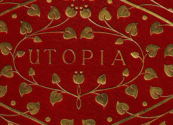Reconceiving the Enlightenment
by Patrick Smyth, PhD
At the outset of “The Concept of Enlightenment,” Horkheimer and Adorno present a brief statement as the fundamental premise of the movement: “Knowledge obtained through such enquiry would not only be exempt from the influence of wealth and power but would establish man as the master of nature” (1). This is a fair summary of the Enlightenment’s fundamental value proposition, encapsulating the two main promises of the period: increased equality and material improvement. The unifying concept of the Enlightenment, and the tool by which these ends were to be achieved, was Reason, and Horkheimer and Adorno use Bacon’s heavily gendered language to represent this driving force: “Therefore, no doubt, the sovereignty of man lieth hid in knowledge. … [N]ow we govern nature in opinions, but we are thrall unto her in necessity: but if we would be led by her in invention, we should command her by action” (1).
Up to this point, Horkheimer and Adorno have presented the Enlightenment on its own terms, situating it with words from a pre-Enlightenment thinker that are clear, if somewhat unflattering. Immediately following, however, they make an interesting rhetorical move:
Knowledge, which is power, knows no limits, either in its enslavement of creation or in its deference to worldly masters. Just as it serves all the purposes of the bourgeois economy both in factories and on the battlefield, it is at the disposal of entrepreneurs regardless of their origins. … Technology is the essence of this knowledge. It aims to produce neither concepts nor images, nor the joy of understanding, but method, exploitation of the labor of others, capital. The “many things” which, according to Bacon, knowledge still held in store are themselves mere instruments: the radio as a sublimated printing press, the dive bomber as a more effective form of artillery, remote control as a more reliable compass. What human beings seek to learn from nature is how to use it to dominate wholly both it and human beings. Nothing else counts.
With this passage, Horkheimer and Adorno carve a straight line through history, connecting the failures and shortcomings of the Enlightenment to the evils of their present moment. This stroke is universalizing and teleological—each present horror is coupled with an Enlightenment principle. Knowledge is paired with enslavement, and methodology with exploitation. The radio is a medium of unilateral control, and the airplane is nothing more than upgraded artillery. Finally, these marginal improvements—these “mere instruments”—are circumscribed, confined to two destructive and dehumanizing domains, the factory and the battlefield.
Having established this causal relationship between the Enlightenment project and modernity, Horkheimer and Adorno are able to distill this progression into a single axiom: “Enlightenment is totalitarian” (4). The horrors of 1947, including fascism, propaganda, and depersonalized murder, all stem from hubris, an overweening attempt by an inept Prometheus to steal the divine fire: “In face of the unity of such reason the distinction between God and man is reduced to an irrelevance” (5).
Unfortunately for the teleological arguments presented in “The Concept of Enlightenment,” history did not stop in 1947. While the previous decades had seen nuclear weapons and Zyklon B, the next enjoyed new antibiotics, antihistamines, and the polio vaccine. While the 30s and 40s saw new media used for oppressive propaganda, the 60s saw liberation fueled by LPs, LSD, and the pill.
Of course, our own time has its own set of horrors and wonders, and, in the balance, GoPro seems a poor trade for drone warfare. Yet it seems to me that Horkheimer and Adorno’s unalloyed condemnation of the Enlightenment is reductive. Technology, from teckne, means making or doing, and what technology enables, it enables for good and ill. Human nature, however, is constant. As Martin observes, “Do you believe … that hawks have always eaten pigeons when they have found them?”


